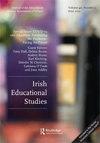Navigating a male dominated domain: experiences of female STEM students in higher education in Ireland
IF 1.2
4区 教育学
Q2 EDUCATION & EDUCATIONAL RESEARCH
引用次数: 0
Abstract
It is well established that female participation in STEM diminishes at all stages of the education pipeline. National policy in Ireland is focussed on initiatives to address the STEM gender gap from early years to the end of secondary school (age 18/19) education. However, strategy in higher education is limited, with gender equality policy primarily aimed at staff and the broader institution. This qualitative research study, involving in-depth interviews with 21 female STEM students provides new insights into the experiences of female students who choose mathematics-intensive STEM fields (physics, computer science, engineering, and mathematics), where the gender gap is most pronounced. The aim of the study was to identify how a predominately male-dominated STEM course and environment influenced female students’ experiences. Prior to entering university, participants held high self-concept and interest in STEM. Using a situated expectancy-value theoretical lens to interpret the data, the research found that unconscious gender bias in university led female students to feel undervalued by their male peers. This negatively impacted their self-beliefs and interest, resulting in female students feeling more pressure to perform and less willing to participate in the learning environment. The implications for policy, practice, and future research are considered.导航男性主导的领域:女性STEM学生在爱尔兰高等教育的经验
众所周知,在教育管道的各个阶段,女性对STEM的参与都在减少。爱尔兰的国家政策侧重于解决从早期到中学毕业(18/19岁)教育的STEM性别差距的举措。然而,高等教育的战略是有限的,性别平等政策主要针对工作人员和更广泛的机构。这项定性研究涉及对21名STEM女学生的深入访谈,为选择数学密集型STEM领域(物理、计算机科学、工程和数学)的女学生的经历提供了新的见解,这些领域的性别差距最为明显。该研究的目的是确定男性主导的STEM课程和环境如何影响女学生的经历。在进入大学之前,参与者对STEM有较高的自我概念和兴趣。运用情境期望值理论的视角来解读数据,研究发现,大学无意识的性别偏见导致女生觉得自己被男生低估了。这对她们的自我信念和兴趣产生了负面影响,导致女学生感到更大的表现压力,更不愿意参与学习环境。本文考虑了对政策、实践和未来研究的影响。
本文章由计算机程序翻译,如有差异,请以英文原文为准。
求助全文
约1分钟内获得全文
求助全文

 求助内容:
求助内容: 应助结果提醒方式:
应助结果提醒方式:


